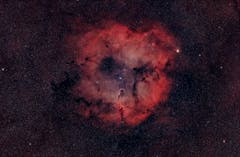Astronomik CLS CCD Filter – Light Pollution Suppression
Overview
The Astronomik CLS CCD filter is designed for astrophotography from locations affected by artificial light pollution. It is optimised for CCD and infrared-sensitive cameras, significantly increasing contrast in deep-sky images while preserving natural star colours.
Thanks to its wide transmission range, a large amount of useful astronomical light passes through the filter, ensuring stars are only minimally dimmed while the sky background is effectively darkened.
Key Benefits
- Enhances contrast between deep-sky objects and the sky background
- Strong suppression of common artificial light sources
- Wide passbands allow high signal throughput
- Integrated IR blocking layer for CCDs, DSLRs, and webcams
- Minimal star dimming with no loss of fine detail
Optical Performance
The CLS CCD filter blocks the emission lines of low- and high-pressure mercury (Hg) and sodium (Na) lamps as well as airglow, while allowing all key astronomical emission lines to pass through.
Important emission lines such as H-alpha, H-beta, and OIII are transmitted at very high efficiency, resulting in improved nebula contrast and a darker background sky.
The integrated IR-blocking layer makes this filter ideal for:
- CCD cameras
- Astro-modified DSLR cameras
- Webcams and cameras without built-in IR filters
Telescope Compatibility
- Suitable for all telescope apertures
- Optimised for focal ratios from f/2 to f/15
- Homofocal with all Astronomik filters (except XT versions)
Usage Notes
- As a camera clip filter, DSLR imaging is possible even under extreme light pollution without damaging colour balance
- Available in 1.25″ and 2″ versions for imaging and visual observation
- If an IR-cut filter is already present in the imaging train, the standard CLS filter may be a more economical alternative
Suitability Guide
- Visual Observation (Rural): Good (depending on mercury vapour lighting)
- Visual Observation (Urban): Neutral – a UHC-E or UHC filter is more appropriate
- CCD Astrophotography: Very good – optimal suppression of light pollution
- DSLR Astrophotography (Unmodified): Good – colour shift with improved contrast
- DSLR Astrophotography (Astro-modified): Very good – excellent white balance
- DSLR (Converted with MC Clear Glass): Very good – excellent white balance
- Webcam / Video (Planets): Unsuitable
- Webcam / Video (Deep Sky): Very good when light pollution is severe
Technical Specifications
- ~95% transmission at 486nm (H-beta)
- ~95% transmission at 496nm (OIII)
- ~95% transmission at 501nm (OIII)
- ~97% transmission at 656nm (H-alpha)
- Passband 1: 450–520nm
- Passband 2: 640–690nm
- Filter thickness: 1mm
- Hard-coated, optically polished special glass
- Moisture-resistant, non-aging, scratch-resistant
- No halos and no internal reflections
- Supplied in a durable protective storage box




























